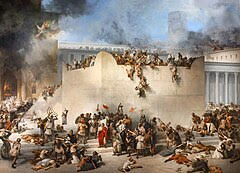Our hands . . .
Where is the city of refuge now? What have we done . . . ?
Pay attention, we are entering a time period of serious internal introspection among the Jewish people and among the Jewish communities of the world — The Hebrew month of Av. — A month of setback, a month of failure, and a month of destruction — and what is our hand in it?

Historical and Historiographical: Five (of many) calamities which occurred in the Month of Av . . .
According to the Mishnah (Tractate Taanit 4:6), five specific events occurred on the ninth day of the Hebrew month of Av that warrant fasting:
- The Twelve Spies sent by Moses to observe the land of Canaan returned from their mission. Only two of the spies, Joshua and Caleb, brought a positive report, while the others spoke disparagingly about the land. The majority report caused the Children of Israel to cry, panic, and despair of ever entering the “Promised Land”. For this, they were punished by God that their generation would not enter the land. The midrash quotes God as saying about this event, “You cried before me pointlessly, I will fix for you [this day as a day of] crying for the generations”, alluding to the future misfortunes which occurred on the same date.
- The First Temple built by King Solomon was destroyed by Nebuchadnezzar in 586 BCE, and the population of the Kingdom of Judah was sent into Babylonian exile. According to the Bible, the First Temple’s destruction began on the 7th of Av (2 Kings 25:8) and continued until the 10th (Jeremiah 52:12). According to the Talmud, the actual destruction of the Temple began on the Ninth of Av, and it continued to burn throughout the Tenth of Av.
- The Second Temple built by Ezra and Nehemiah was destroyed by the Romans in 70 CE, scattering the people of Judea and commencing the Jewish exile from the Holy Land.
- The Romans subsequently crushed Bar Kokhba’s revolt and destroyed the city of Betar, killing over 500,000 Jewish civilians (approximately 580,000) on 4 August 135 CE.
- Following the Bar Kokhba revolt, Roman commander Quintus Tineius Rufus plowed the site of the Temple in Jerusalem and the surrounding area, in 135 CE
Today: this is just too much material — maybe just save it and read at another time or delete it and roll the dice on what we know and what we are experiencing . . . .
* I rarely write about current Israeli politics and Israeli absurdities (both dangerous and otherwise) which I perceive at this time, especially in looking from this side of the world eastward towards Jerusalem, the Jewish Homeland.
That being said, when events there impact the health and welfare of American and Diaspora Jewry (as they often will) then I pay a little closer attention than I might otherwise do. I am caught in a little bit of a bind here because, on the one hand, I hold the belief that the Israelis are the responsible party to determine the social and political makeup of their own country (and their future) and yet on the other hand, I see that the actions of the current government coalition under Netanyahu, Rothman, Smothrich, and Ben Gvir (all of whom claim to be acting in the interests of true democracy) as undermining the identity (and interests) of the Jewish community/communities of the Diaspora (and for us, that should read: American Jewry and American Jewish Identity). And even on the same hand, I am not alone in being quite concerned as to how all of this affects the relationship of Israel with America and American institutions (political, governmental, communal, and social). For this point of view, please have a look at the Friedmann piece in the link below. For the record, he is not the boy who cries wolf — although at times, he can be mistaken. Today, his view is a view worth noting.
No Firewall, Here is: Thomas Friedman in today’s NY TIMES:
____________
* Immediately below: Copied (and cut a little) is an overview written by an American Jewish writer, (Martin J. Raffel, who is) an observer of communal trends both in Israel and among Diaspora Jewry. Currently, I find his observations compelling — and for the record, he is not in any way supportive of the current Israeli government coalition-linked parties (read: the current Netanyahu Coalition) along with their judicial overhaul plans.
___________________________________
This is the opinion piece I mentioned above — and it is the opinion of Martin J. Raffel
The Israeli Government’s (i.e. the Coalition) plan
(note: perhaps overly detailed)
How does the Netanyahu-led coalition government plan to attack the independence and authority of Israel’s Supreme Court? Justice Minister Aryeh Levin initially presented a legislative package that would, among other things:
** change the way judges are selected, especially to the Supreme Court, so that the government could exercise control over who serves.
**create an “override” option, which would give the government the power to reverse any Supreme Court ruling it did not like with a simple 61-person vote in the Knesset.
** eliminate the power of the Supreme Court to review or strike down government decisions based on their “extreme unreasonableness,” e.g., when the court struck down Shas leader Aryeh Deri’s appointment by Netanyahu as a government minister despite Deri’s felony convictions and his pledge not to return to government for an extended period.
The “override” option, perhaps the most blatantly anti-democratic measure, drew the strongest negative response both inside Israel and internationally. Consequently, Netanyahu said it would be thrown out. That said, a government minister from Netanyahu’s own Likud party said, “My assessment is that the override clause will come in the future.”
Attention then shifted to the process of selecting judges. Judges are selected by a 9-member committee composed of three current Supreme Court justices, two members of the Israel Bar Association, two representatives of the government, including the Justice Minister who chairs the committee, and two Knesset members. By long-standing tradition, one Knesset member comes from the coalition and one from the opposition.
Five votes are needed for the appointment of lower court justices and seven votes are needed for the 15-member Supreme Court justices. Therefore, this system requires compromise and consensus among the four components of the committee, especially with respect to Supreme Court justices. The system has worked. Over time, because of this need to compromise, judges with diverse approaches and backgrounds have been selected. Moreover, the basic idea here is that judges should be selected based on professional credentials, not political considerations.
Israel’s Supreme Court has enjoyed wide respect around the world. For many years, the Palestinians have been trying to get Israeli soldiers prosecuted for war crimes before the International Criminal Court (ICC) and the International Court of Justice (ICJ). But those tribunals have declined to pursue the cases because of their confidence in an independent Israeli judicial system to deal with IDF misbehavior. If Israel’s judicial independence is undermined, Israeli soldiers risk exposure to the ICC and ICJ. That is one of the reasons some of the strongest opposition to the government’s judicial plan comes from the ranks of Israel’s military elites and reservists.
Recent History
A pivotal juncture in the drama came when Netanyahu announced the firing of Defense Minister Yoav Gallant on March 26 for publicly criticizing the government’s judicial plan. This firing was never implemented.
It prompted the largest street protest yet and threats from large numbers of reservists, including from the elite ranks of the IDF, not to show up for duty; in an unprecedented development, a general strike was called jointly by business and labor. Prominent economists warned that Israel’s high-tech sector could take a serious hit from the unstable political situation.
Just before the Passover holiday and Knesset recess — under enormous internal pressure from the protests and external pressures from the Biden administration and Diaspora Jewry — Netanyahu agreed to “pause” the judicial legislation to engage in negotiations with the opposition under the auspices of Israeli President Herzog. Netanyahu warned that if no agreement was reached, the government’s plan would be brought back during the Knesset’s summer session, which runs until the end of July.
On June 14, the Knesset voted on the two representatives to serve on the judicial selection committee. Surprisingly — and a blow to Netanyahu’s leadership — the opposition candidate was elected because some members of the coalition voted for her, while the coalition candidate lost. This has left the judicial selection committee in limbo because it cannot convene until the second member of the Knesset is elected. Another Knesset vote, this time to elect a Knesset member from the coalition, is expected to take place soon. So, for the time being, no justices can be selected to fill vacancies on the courts. Opposition leaders Yair Lapid and Benny Gantz declared a suspension in the negotiations until the Judicial Selection Committee can be formed and convened.
Netanyahu continues to face pressure from Justice Minister Levin, Likud hardliners, and his ultra-religious and extreme nationalist partners to just move ahead with judicial overhaul legislation, which, presumably, it has the numbers in the Knesset to do. Recognizing that this move would intensify tensions in Israeli society with unforeseen political, economic, and even security consequences, Netanyahu announced that the judicial selection issue, possibly with modifications in the government’s proposal, will be held over to the Knesset’s winter session which begins in October after the Jewish holidays.
On June 20, lawyers gathered in record numbers to elect the new chair of the Israel Bar Association. Remember this is important. The chair appoints the two bar members who serve on the judicial selection committee. The candidate who opposed the government’s plan won handily. In response, the government has introduced a bill that would strip the Israel Bar Association of most of its powers, including the ability to participate in the judicial selection committee. According to the bill, which passed a preliminary reading on July 5 by a vote of 50-43, that power would be vested in a yet-to-be-created Judicial Council led by a district court judge appointed by Justice Minister Levin, a principal architect of the government’s judicial plan. The bill has been referred to the Knesset Constitution, Law, and Justice Committee for further preparation.
With the override clause seemingly off the table and the judicial selection process in limbo, Netanyahu has said the government may go ahead with legislation that would limit the ability of the Supreme Court to invalidate government actions using the reasonableness doctrine. This item is currently being deliberated by the Knesset.
